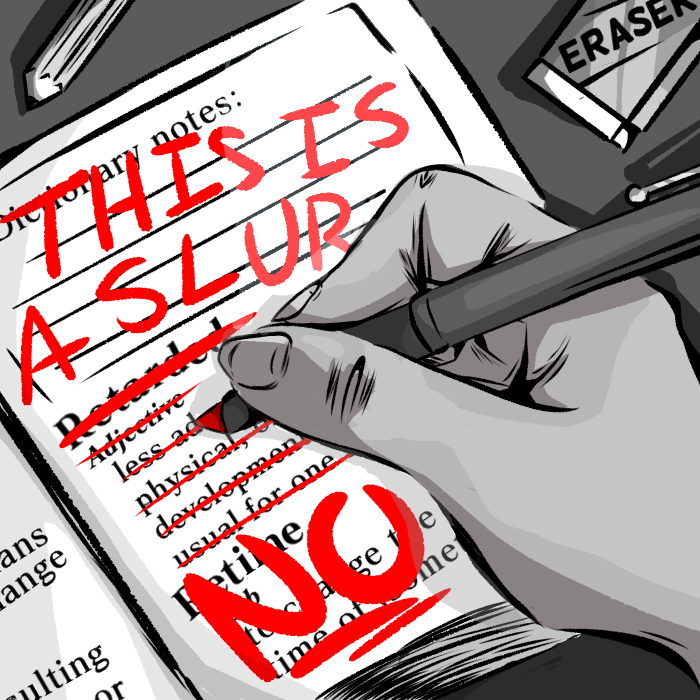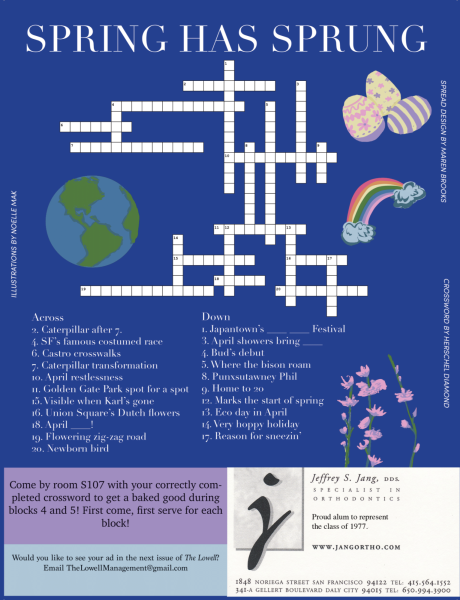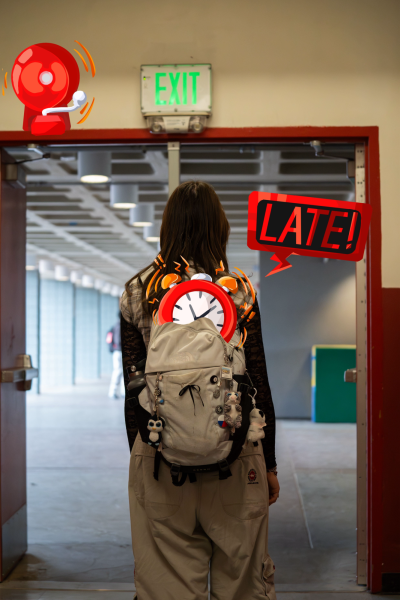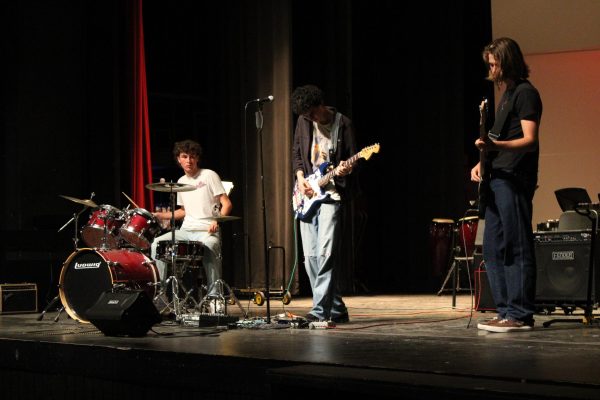It’s time to end the use of a hate-filled slur
The first time I heard the r-word was in sixth grade. Someone in my class jokingly made a comment saying, “He’s such a r*tard.” Having no clue what the word meant, I laughed along, thinking it was just another middle school insult.
In the six years since that moment, I have been exposed to the r-slur many more times, most often in a similarly casual context — an offhand comment or joke meant to insult a friend. Due to the exclusionary nature of the r-slur, it should not be used. It continues to marginalize people with intellectual disabilities through its normalization in conversation and the media.
Historically, the r-slur has been associated with people that have intellectual disabilities. Though today it is often used more casually, what many fail to realize is that the connection is still present. Having this understanding of the word, each time I hear it I am startled by the ease with which it is used and struck by how unaware people are about the weight that this word carries and its impact on those around them.
The r-slur is typically used as a pejorative in one of two cases. The first is a statement by someone who is genuinely ableist, believing that people with disabilities are less than others due to their disabilities, who uses the word to demean those with disabilities. The other, more common, way it is used is to call someone stupid, often not directed at someone with an intellectual disability. After years of normalization and integration into people’s vocabulary, some see this is acceptable. However, the issue with it lies in the history of the word.
The r-slur was first used in 1426, originating from the Latin verb retardare, meaning to hinder or make slow. Its first usage referencing those with intellectual disabilities was made in 1961, within the term “mental r*tardation.” It was used to replace older descriptions that had already developed a negative connotation, such as “idiot” and “imbecile”. After the word began to be used as a pejorative, its medical definition received a lot of backlash. Rosa Marcellino, an eight year old with Down Syndrome, felt hurt by her technical description of being “mentally r*tarded” at school. Her family began a campaign to change the terminology in official records. In 2010, after their movement gained traction, President Barack Obama passed Rosa’s Law, which led to the creation of a new technical term: “intellectual disability”. Although this legal adaptation didn’t bar anyone from using the r-slur and only changed the usage in legal and medical situations, it was a public declaration of the unacceptability of the word.
Despite the passing of this law, the r-slur is still prevalent in today’s teenagers’ vocabulary. It comes up uncomfortably often when I’m talking to friends or peers. They use it in a joking manner referring to friends who don’t have an intellectual disability. I have heard arguments made about it “not being as bad as other slurs” or someone not knowing the significance of it compared to other “bad” words, showing either a lack of awareness or care about the history of the word.
Modern media has played a role in normalizing the r-slur in teenagers’ vocabulary. Media unapologetically uses the slur with no message or significance to justify its utilization. An example of this is in the popular teen drama, “Euphoria”. When comforting a friend, one of the characters says that “people are r*tarded.” The only consequence of their usage of the slur is the friend’s response: “I don’t think you can say that word.” Other than that, the instance goes unexplained. Additionally, in the overall context of the scene, the usage of this slur has no impact whatsoever. If other slurs were used this way it wouldn’t be tolerated, yet due to the normalization of this particular slur it is unquestioned.
After continued use of the slur, other movements continued the fight. The Special Olympics campaign, “Spread Word: Inclusion,” was directed towards social change, rather than policy changes. It shares words from people with disabilities, educating on the harmful effects of the r-word. When I read direct quotes about the feelings of those with intellectual disabilities and their allies I was moved by their message of minimizing feelings of exclusion. “What’s wrong with ‘r*tard’? I can only tell you what it means to me and people like me when we hear it. It means that the rest of you are excluding us from your group. We are something that is not like you and something that none of you would ever want to be…I want you to know that it hurts to be left out here, alone,” said John Franklin Stephens, an athlete in the Special Olympics. I encourage everyone to read such messages. Learning about different people is the first step to understanding them.
Using the r-slur, even in a context unrelated to people with disabilities, is a distinguisher, carrying the implication that those with intellectual disabilities are less worthy of respect. Calling someone a “r*tard” and using it as an insult is essentially saying that they’re “as stupid as someone with intellectual disabilities”. This alienation of a group of people is unjust and cruel. Though often not the intention, this is how using the r-word makes many of those with disabilities feel: isolated and looked down upon.
What I have done, and would suggest to others, is to speak up when it’s used. If I hear the r-slur used, I talk to people about their language. Though it can be hard to change someone’s vocabulary, telling people the impact their words are having often convinces them not to use it. Educating others on these effects can lead to an overall better understanding and inclusion of people with intellectual disabilities. Educate yourself on the r-slur to better your awareness and become more inclusive of people with intellectual disabilities.

Maya is a senior at Lowell. One of her favourite pastimes is making fun of bad movies. She is also an avid reader and a collector of small boxes.

You can usually find Dary blasting music in her airpods and speed walking around in outfits she spent too much time thinking about, or that embodies the Adam Sandler within her. She loves to chat, so feel free to say hi or ask for help!












